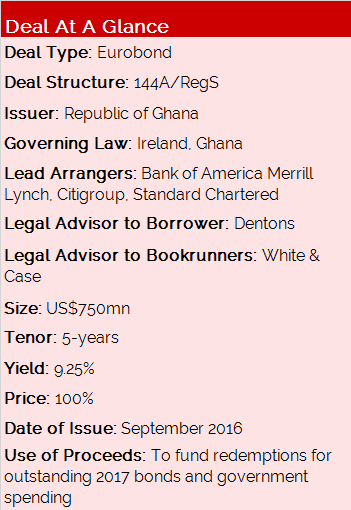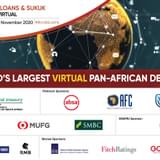 Background
Background
The Republic of Ghana originally set out to buy back US$100mn of outstanding 2017 notes that were originally issued in 2007, and help finance the government’s 2017 spending plans.
Although the government originally planned to launch the bond sale in August, it delayed the sale over cost concerns, and the need to pass key fiscal management legislation required as part of the country’s participation with an IMF programme.
With the passage of the legislation in August, Ghana was able to hit the market in early September with a US$750mn 5-year Eurobond at an aggressive price point, generating an orderbook of over US$4bn.
Transaction Breakdown
In early August 2016 the Republic of Ghana began marketing a US dollar bond (between US$750mn and US$1bn) shortly after launching a tender offer to buy back the remainder of its outstanding 2017 notes. Prior to beginning the marketing process in August, the Republic of Ghana had close to US$500mn in outstanding redemptions due on its 2017s.
After a series of roadshows with global investors – during which the country’s Parliament had passed Public Financial Management Law and approved an amended Bank of Ghana Act, which were required as part of its participation with an IMF funding programme – the Republic of Ghana hit the market with a US$750mn 5-year bond carrying IPTs in the “high 9s” on September 8.
The bond is a back-end amortizing maturity with an average tenor of 5 years. The principal will be repaid in three instalments of US$250mn in September 2020, September 2021 and September 2022.
The notes saw strong demand over the course of the day, with the orderbook swelling to nearly US$4.5bn by early afternoon. Strong demand for the notes allowed the sovereign to tighten pricing down to 9.25%, over 60bp below IPTs, with a final overbook of US$4.1bn.
At the time of issuing the notes prices within the sovereign’s 2023s, which were yielding 9.3% - down from 10.4% a month before, when it was initially targeting the bond issuance. Timing was critical here: with uncertainty around the US Fed’s willingness of hike interest rates in early September and national elections in December, Ghana had to execute the trade quickly in order to secure aggressive pricing.
American investors picked up 45% of the notes, UK investors 41%, European investors 12% and others 2%. Asset managers picked up 85% of the notes, hedge funds 10%, banks and private banks 2%, and insurers & pension funds 3%.









